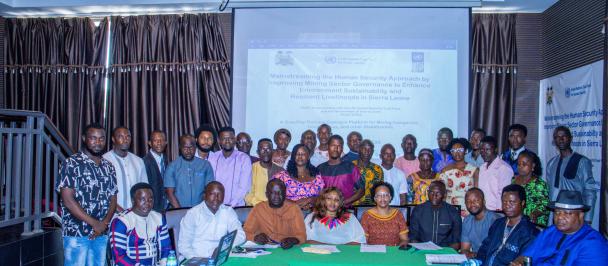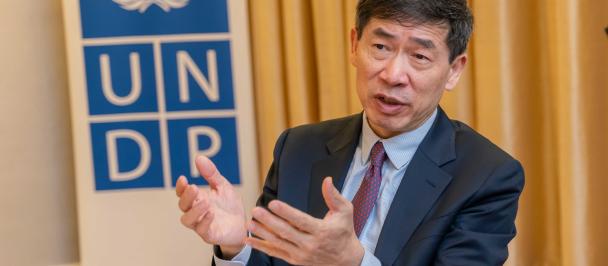As Eswatini citizens go to the polls in September
Unify and eliminate discrimination during elections – Chiefs urged
August 25, 2023

One of the participants submitting during the chiefs training on elections.
The Elections and Boundaries Commission (EBC), through UNDP support, facilitated regional training sessions for chiefs on their roles in upholding international standards during elections. The training occurred before the polls on 29 September, where emaSwati will elect Members of Parliament, Tindvuna Tetinkhundla (Elected Heads of Inkhundla) and Bucopho (Chiefdon Councillors). According to EBC, over 580,000 people registered to vote in this year's elections under 59 Tinkhundla/Constituencies. Voters are drawn from 336 chiefdoms, and they will cast their votes in 664 polling stations.
The first part of the elections (primary) will take place on 26 August 2023, and the final (secondary) on 29 September 2023.
To ensure the smooth running of the process and equip traditional authorities and citizens on compliance with the law and international elections standards, EBC collaborated with UNDP to facilitate the training of over 400 chiefs from across the country.

EBC Legal Advisor, Mbuso Dlamini
According to Mbuso Dlamini, EBC Legal Advisor, authorities and the electorate must be aware of some changes in the elections' legislative framework. For example, he said, although in previous elections Bucopho would be elected during the primary elections, in 2023, they will be voted for during the secondary elections.
"Unlike in previous years where votes had to be transported to one polling station for counting, this year ballot papers will be counted at each polling station, and the figures will be consolidated," said Dlamini.
The Commission on Human Rights & Public Administration (CHRPA) also reminded the forum of the constitutional provision on the role of chiefs and the rights of emaSwati relating to elections, stressing the importance of them maintaining a neutral and unifying role at this time.

UNDP Governance Specialist, Linda Nxumalo
Addressing the participants, UNDP Governance Specialist, Linda Nxumalo, emphasised the importance of the role that Chiefs can play in encouraging the election of the previously marginalised groups – women, youth and persons with disabilities – even as they maintain their unifying role in the community. She further articulated the importance of women participating and occupying decision-making positions in the country.
"Studies show that in countries where women are in power, those countries are often doing better economically as decision-making positively impacts economic growth, also that corruption rates are much lower, in those countries, which contributes to economic growth and stability," she said. "That's why even Eswatini is trying to have women partaking in the elections."
Notable sentiments shared by the traditional leaders were that, indeed, they are the unifiers in the various chiefdoms and that they need to do more in playing such a role, eliminating discrimination against any person, especially the vulnerable groups and promoting peace.
On the issue of participation of the marginalised groups, the chiefs noted that much more effort has to be invested in getting women to support each other as statistics reveal that the population consists of more women than men. Therefore, if women were to support each other, more of them could occupy the crucial spaces. In addition, it was agreed that chiefs and families have a vital role in encouraging all to support women.
It was also brought to light that most youths do not attend activities hosted by the traditional structures, hence the need to devise strategies for the participation and inclusion of young people to enhance their understanding of the governance processes and for their meaningful contributions to the national development agenda.
Further, whilst other chiefs felt that they were not properly consulted on the amendments of the legal framework, some were quick to flag that the amendments were pursuant to concerns from the citizens on how elections were conducted.
"EmaSwati were complaining that the polling officers took a long time to bring back results, hence the decision to have ballot papers counted in polling stations," one of the participants said.
A key takeaway was that there is a need for further engagement, even post elections, on continuous election education, gender parity issues, promotion of peace and rights of all.
The Regional Administrators (RAs) and representatives of chiefs in the respective regions expressed gratitude to the traditional authorities for making time to participate in the training. They also expressed gratitude to EBC for convening them.
The EBC also extended its appreciation to the RAs for convening the traditional leaders, the participants for dedicating their time and engaging meaningfully, and the CHRPA and UNDP for the technical and financial support.

 Locations
Locations



